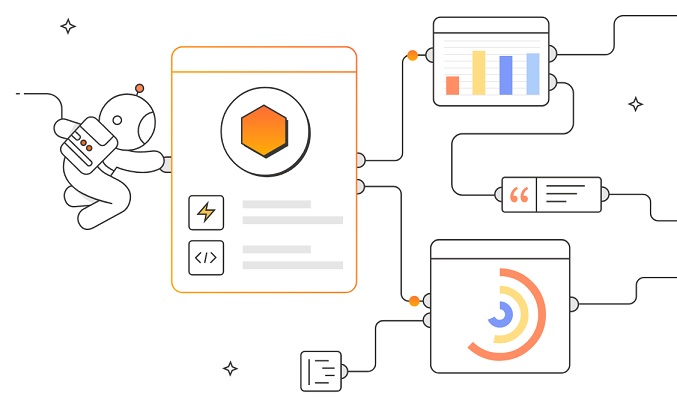webAI and MacStadium(link is external) announced a strategic partnership that will revolutionize the deployment of large-scale artificial intelligence models using Apple's cutting-edge silicon technology.
"The State of the API Report sheds light on the realities of API usage and how APIs are delivering value to modern organizations," said Abhinav Asthana, co-founder and CEO of Postman. "More companies are adopting an API-first approach to software development, and for the second year in a row, outperforming organizations that haven't. Beyond the technical advantages, organizations are also seeing a direct impact on their bottom line, reporting their APIs as revenue generators. This outlook, combined with the rising use of AI tools, is fundamentally changing our relationship to software and the way we build it — and APIs are at the center of this shift."

Key findings include:
APIs are a moneymaker for most
Almost two-thirds of respondents say their APIs generate revenue. Of those respondents, 43% said their APIs generate over a quarter of company revenue. In the financial services and advertising sectors, revenue was especially important. It was judged the No. 2 measure of public API success, just after usage.
API pricing increasingly matters
When deciding whether to integrate with an API, 47% of respondents said price is a top consideration. That's up from 41% in each of the past two years. While other factors ranked higher than pricing, this finding may reflect a more cost-conscious API consumer in the wake of tech's economic contraction.
Most API professionals are using AI to help code
60% of respondents say they're using generative AI. More than half of those use it to find bugs in their code, and over a third are relying on AI to generate code. When asked what type of project excites developers in the coming year, the top answer was building AI-powered apps.
The outlook for API investment has brightened
92% of respondents say investments in APIs will rise or stay the same over the next 12 months, which is up from 89% last year. This increase may reflect a sense in some quarters that the worst of tech's economic contraction has passed. At the same time, fewer respondents expect to cut API investments this year.
API security is improving, but some sectors have work to do
API security improved for most respondents, with the frequency of incidents down in 2023. But some sectors fared worse than others. Automotive, education, and retail were sectors where survey-takers said monthly incidents occurred at higher rates than average.
Number of API-first leaders swells by almost half
11% of respondents defined themselves as API-first leaders, up from 8% in each of the previous two years. This elite group excels in almost every metric, including how fast it can produce APIs and how quickly it can recover when an API goes down.
Methodology: Produced by Postman, the report is based on two sources: a survey of over 40,000 developers and API professionals from around the world and anonymized, aggregated data from the Postman API Platform. The survey was fielded over approximately five weeks in May and June 2023.
Industry News
Development work on the Linux kernel — the core software that underpins the open source Linux operating system — has a new infrastructure partner in Akamai. The company's cloud computing service and content delivery network (CDN) will support kernel.org, the main distribution system for Linux kernel source code and the primary coordination vehicle for its global developer network.
Komodor announced a new approach to full-cycle drift management for Kubernetes, with new capabilities to automate the detection, investigation, and remediation of configuration drift—the gradual divergence of Kubernetes clusters from their intended state—helping organizations enforce consistency across large-scale, multi-cluster environments.
Red Hat announced the latest updates to Red Hat AI, its portfolio of products and services designed to help accelerate the development and deployment of AI solutions across the hybrid cloud.
CloudCasa by Catalogic announced the availability of the latest version of its CloudCasa software.
BrowserStack announced the launch of Private Devices, expanding its enterprise portfolio to address the specialized testing needs of organizations with stringent security requirements.
Chainguard announced Chainguard Libraries, a catalog of guarded language libraries for Java built securely from source on SLSA L2 infrastructure.
Cloudelligent attained Amazon Web Services (AWS) DevOps Competency status.
Platform9 formally launched the Platform9 Partner Program.
Cosmonic announced the launch of Cosmonic Control, a control plane for managing distributed applications across any cloud, any Kubernetes, any edge, or on premise and self-hosted deployment.
Oracle announced the general availability of Oracle Exadata Database Service on Exascale Infrastructure on Oracle Database@Azure(link sends e-mail).
Perforce Software announced its acquisition of Snowtrack.
Mirantis and Gcore announced an agreement to facilitate the deployment of artificial intelligence (AI) workloads.
Amplitude announced the rollout of Session Replay Everywhere.
Oracle announced the availability of Java 24, the latest version of the programming language and development platform. Java 24 (Oracle JDK 24) delivers thousands of improvements to help developers maximize productivity and drive innovation. In addition, enhancements to the platform's performance, stability, and security help organizations accelerate their business growth ...













